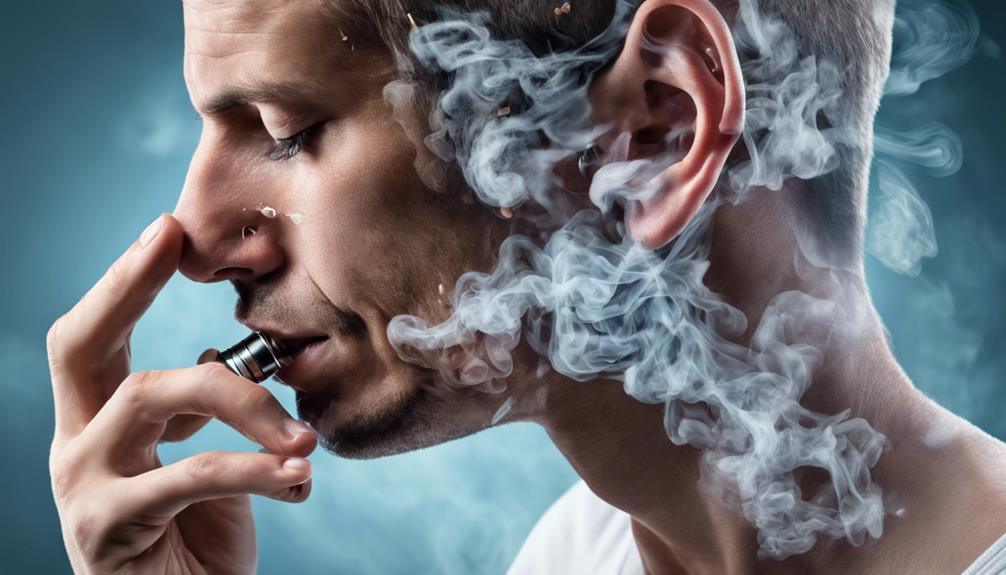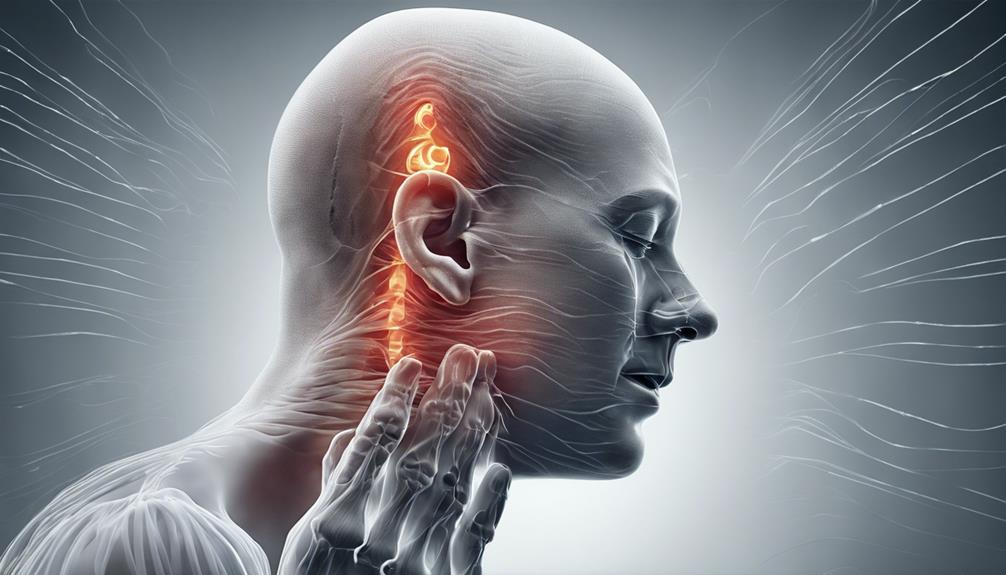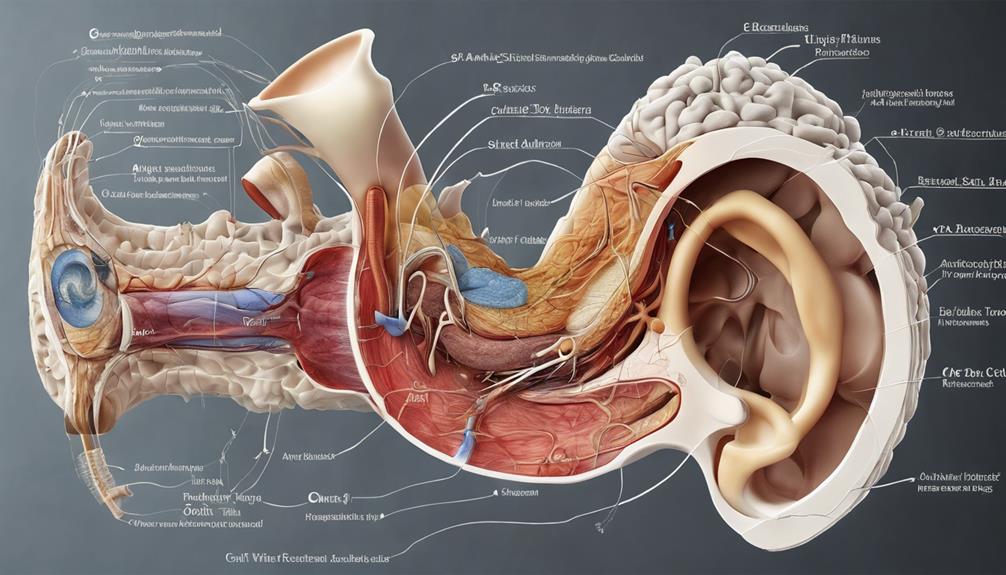As we delve into the different health effects of vaping, one crucial observation stands out – the potential link between vaping and hearing loss. The intricate workings of our ears could be disrupted by the harmful effects of e-cigarettes, leading to a negative outcome.
Unraveling the intricate web of connections between vaping and hearing loss paints a picture that demands our attention. Let's explore this silent threat and uncover the intricate details that may surprise even the most discerning individuals.
Key Takeaways
- Nicotine and vape juice ingredients harm inner ear cells, potentially leading to irreversible hearing loss.
- Young adults, attracted by flavors and marketing, risk damaging their hearing through vaping.
- Immediate cessation of vaping is crucial if sudden hearing loss occurs to prevent further damage.
- Understanding vaping risks is vital to protect auditory health and prevent early onset hearing issues.
The Link Between Vaping and Hearing Loss
Examining the correlation between vaping and hearing loss reveals compelling evidence of the detrimental effects nicotine and other chemicals in vape juice can have on auditory health. Nicotine, a primary component in e-cigarettes, is known to restrict blood flow to the inner ear. This restriction can lead to damage of the delicate inner ear hair cells, crucial for converting sound vibrations into electrical signals that the brain interprets as sound. When these inner ear hair cells are harmed, hearing loss can occur.
Furthermore, vape juice, even when nicotine-free, contains harmful chemicals that can directly impact the inner ear and contribute to hearing issues. The exposure of teens to these substances in vape products puts them at risk of developing hearing loss at an early age. Research indicates that the damage caused by nicotine in e-cigarettes to the cochlear cells can result in irreversible hearing impairment. Understanding the link between vaping, nicotine, and hearing loss is essential in highlighting the dangers associated with the use of e-cigarettes and the importance of preserving auditory health.
Nicotine's Impact on Hearing Health

Nicotine's detrimental impact on hearing health is a significant concern due to its potential to cause irreversible damage to crucial cochlear cells responsible for sound interpretation. When considering the effects of nicotine on hearing, it's essential to understand how this substance can harm our auditory system.
Key Points:
- Blood Flow Restriction: Nicotine in e-cigarettes has been shown to restrict blood flow to the inner ear, which can lead to damage to the delicate cochlear cells responsible for processing sound signals.
- Cochlear Cell Damage: Exposure to nicotine through vaping can result in irreversible harm to the vital cochlear cells in the ear, impacting our ability to interpret sounds accurately.
- Importance of Blood and Oxygen Supply: Adequate blood flow and oxygen supply are crucial for maintaining optimal ear health. Nicotine's interference with these essential processes can contribute to long-term hearing issues and potential hearing loss.
Understanding the impact of nicotine on hearing health underscores the importance of making informed choices to protect our auditory well-being.
Hidden Risks in Vape Juice
Amidst the growing popularity of vaping, concerns arise regarding the hidden risks associated with vape juice ingredients and their potential impact on hearing health. Vape juice, whether it contains nicotine or not, harbors various components like flavorings, colorings, and untested chemicals that may jeopardize auditory well-being.
Of particular concern is propylene glycol, found in vape juice and known to be detrimental to the inner ear, potentially leading to hearing impairments over time. The unregulated nature of the vape juice industry further exacerbates these risks, as discrepancies between labeled and actual ingredients could introduce unknown substances harmful to hearing health.
The lack of transparency regarding the composition of vape juice raises red flags, creating a breeding ground for hidden dangers that could compromise the auditory system. As vaping continues to gain traction, it's imperative to understand and address the potential risks posed by vape juice to safeguard our hearing health.
Hearing Loss Risks for Young Adults

With the surge in teen vaping rates and the concerning impact of e-cigarette toxins on hearing nerve pathways, young adults face heightened risks of developing hearing loss. Teenagers are at a critical stage of development, making them particularly vulnerable to the harmful substances present in e-cigarettes. Here are three key points to consider regarding hearing loss risks for young adults:
- Increased Exposure to Toxins: Young adults who engage in vaping are exposing themselves to a variety of harmful substances, such as nicotine, that can damage the delicate hearing nerve pathways over time.
- Marketing Influence: Marketing campaigns and the easy accessibility of e-cigarettes online contribute to the rising trend of vaping among young adults, increasing their likelihood of encountering these harmful toxins and risking their hearing health.
- Appealing Flavors: The enticing flavors of vape products attract young people to vaping, further exacerbating their risk of hearing loss by encouraging continued use and prolonged exposure to the damaging effects of these substances.
Immediate Action for Sudden Hearing Loss
When sudden hearing loss is observed following vaping, immediate cessation of vaping activities is critical to address potential health concerns. Continuing to vape could exacerbate the issue and lead to further damage. Seeking immediate help from an Ear, Nose, and Throat (ENT) specialist or a hearing healthcare professional is crucial in these situations. These professionals can conduct thorough evaluations to determine the extent of the hearing loss and provide appropriate treatment options.
Immediate action is necessary when experiencing sudden symptoms like tinnitus or hearing loss post-vaping. Consulting with a healthcare provider specializing in hearing health can aid in diagnosing and managing any potential issues arising from vaping. Prompt medical attention is essential to address sudden hearing problems potentially linked to vaping. Remember, taking quick action and seeking professional advice can significantly impact the outcome and help in mitigating the effects of vaping-related hearing loss.
Frequently Asked Questions
How Does Vaping Cause Hearing Loss?
We believe vaping causes hearing loss due to nicotine's blood flow restriction in the inner ear and harmful chemicals in vape juice. These substances can damage crucial inner ear structures, like hair cells, essential for hearing.
Symptoms such as tinnitus, blocked ears, and hearing loss may result from e-cigarette chemical exposure.
Further studies are needed to fully understand vaping's impact on hearing health.
What Are the Long Term Effects of Vaping on the Brain?
Long-term effects of vaping on the brain can be concerning. Research suggests that chronic exposure to chemicals in vape juice may lead to neuroinflammation and oxidative stress.
Nicotine, a common component in e-cigarettes, can alter neurotransmitter levels, impacting mood and behavior.
Additionally, studies indicate that vaping during adolescence can disrupt brain development and increase the risk of addiction.
These findings emphasize the need for further investigation into the neurological consequences of vaping.
Is Vape Worse Than Smoking?
Vaping isn't necessarily worse than smoking; it poses its own set of risks. E-cigarettes can contain harmful chemicals like nicotine, which may lead to hearing loss by restricting blood flow to the inner ear and damaging cochlear cells.
The customization options in e-cigarettes, such as adjustable nicotine levels, increase the likelihood of hearing issues. It's essential to understand the unique risks associated with vaping to make informed choices about our health.
Will Tinnitus Go Away if I Stop Vaping?
If we stop vaping, tinnitus may improve or disappear as it can be triggered by harmful chemicals in vape juice. Ceasing vaping is crucial to reduce the risk of worsening tinnitus symptoms linked to inner ear damage.
Eliminating exposure to vaping chemicals helps manage tinnitus. Studies suggest quitting vaping can lead to reduced tinnitus frequency or intensity.
Seeking professional guidance is recommended for exploring treatment options and monitoring improvements.
Conclusion
In conclusion, the intricate connection between vaping and hearing loss is a stark reminder of the dangers posed by nicotine exposure. Like the delicate inner workings of the cochlea, our hearing health is fragile and susceptible to harm.
Just as a symphony relies on each instrument playing its part, our ears require protection from harmful substances like nicotine in order to maintain their exquisite function.
Let's tune into the importance of safeguarding our hearing for a harmonious future.











